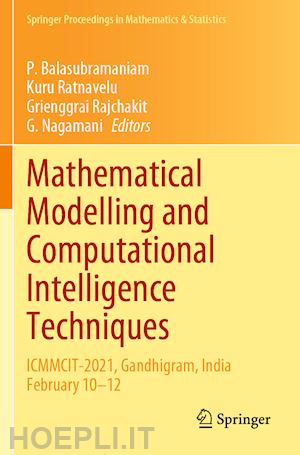P. BALASUBRAMANIAM is Professor at the Department of Mathematics, The Gandhigram Rural Institute (Deemed to be University), Gandhigram, Tamil Nadu, India, since 2006, where he joined as Lecturer in Mathematics in 1997. He earned his Ph.D. in Mathematics from Bharathiar University, Coimbatore, Tamil Nadu, India, in 1994, with specialization in control theory. He was Visiting Professor at the Institute of Mathematical Sciences, University of Malaya, Malaysia, from September 2011 to March 2012 and Pusan National University, Pusan, South Korea, for promoting research in the field of control theory and neural networks from 2001 to 2006. His research interest includes the areas of control theory, fractional differential equations, stochastic differential equations, soft computing, stability analysis, cryptography, neural networks, image processing, and reaction-diffusion equations. He received the Mid-Career Award by the University Grants Commission, the Government of India, New Delhi, in 2019, and is recognized among the top two-percent scientists in India in the field of artificial intelligence and image processing by Stanford University, USA, in 2020.
KURUNATHAN RATNAVELU is Director at the Institute of Computer Science and Digital Innovations, UCSI University, Kuala Lumpur, Malaysia. Earlier, he served as Deputy Dean of Science and Deputy Vice-Chancellor (Development), as well as the Head of the UM Strategic Planning Unit under the Vice-Chancellor, in the University of Malaya. He played a key role in the High Impact Research Program at the University of Malaya. He received his Ph.D. in atomic physics from Flinders University, Australia, with a Flinders Research Scholarship in 1990. His recent international recognitions are Council Member of the Association of Asia-Pacific Physical Societies (2016–2019, 2020–2023).
With more than 30 years of academic and research experience in Malaysia, Prof. Ratnavelu is the recipient of the 19th Fellow of Persatuan Sains Matematik Malaysia (2018); the Inaugural Distinguished Alumni Award by Flinders University for his contributions to atomic physics as well as education in Malaysia (2006); and the Malaysian Toray Science Foundation Science and Technology Award (2004). His professional contribution to Malaysia has been in the development of physics and mathematics in the country since the 1990’s in his capacity as the Honorary Secretary of the Institut Fizik Malaysia (since 1996 until now) and Malaysian Mathematical Society (PERSAMA), respectively. His research interests are in theoretical atomic collision processes.
GRIENGGRAI RAJCHAKIT is Lecturer at the Department of Mathematics, Faculty of Sciences, Maejo University, Chiangmai, Thailand. He completed his Ph.D. in Applied Mathematics from the King Mongkut’s University of Technology Thonburi, Bangkok, Thailand, in the area of stability and control of neural networks. He is the recipient of the Thailand Frontier Author Award by Thomson Reuters Web of Science in 2016 and the TRF-OHEC-Scopus Researcher Awards by The Thailand Research Fund (TRF), Office of the Higher Education Commission (OHEC) and Scopus in 2016. His research interests include complex-valued neural networks, complex dynamical networks, control theory, stability analysis, sampled-data control, multi-agent systems, T-S fuzzy theory, and cryptography. A reviewer for various internal journals of repute, he has authored and co-authored more than 133 research articles for various international journals.
G. NAGAMANI is Assistant Professor at the Department of Mathematics, The Gandhigram Rural Institute (Deemed to be University), Gandhigram, Tamil Nadu, India, since November 2011. Earlier, she served as Lecturer in Mathematics at Mahendra Arts and Science College, Namakkal, Tamil Nadu, India, from 2001–2008. She completed her Ph.D. in Mathematical Sciences specializing in the area of passivity analysis of neural networks with time-varying delays from The Gandhigram Rural Institute (Deemed to be University), Gandhigram, Tamil Nadu, India, in 2011. She is the recipient of the Tamil Nadu Young Women Scientist Award (TYWSA), from the Tamil Nadu State Council for Science and Technology, in 2012, for her remarkable research contribution in the field of mathematical sciences. Her research interest includes modeling of stochastic differential equations, neural networks, dissipativity and passivity analysis and control theory.











